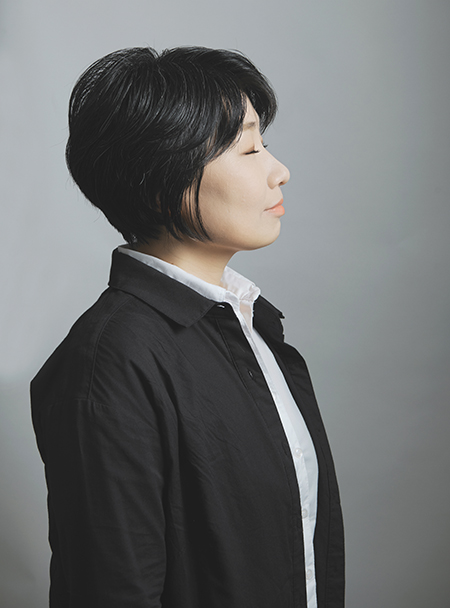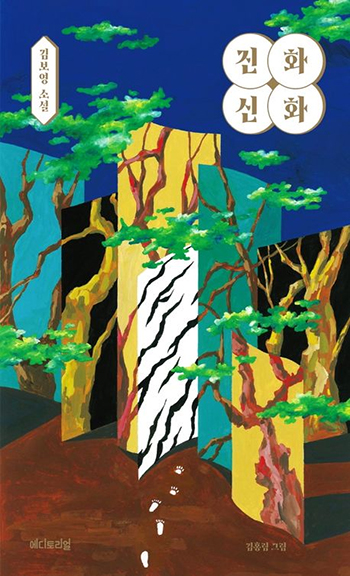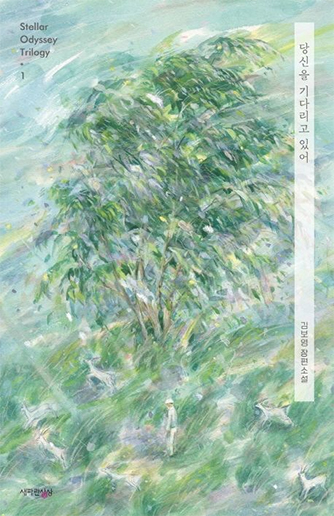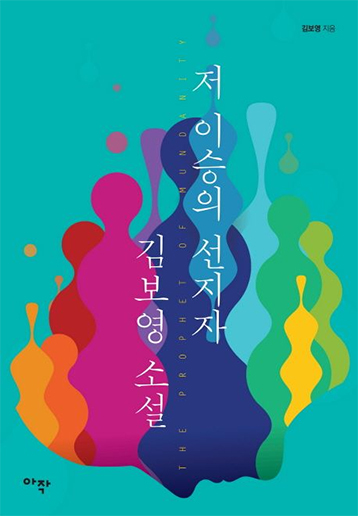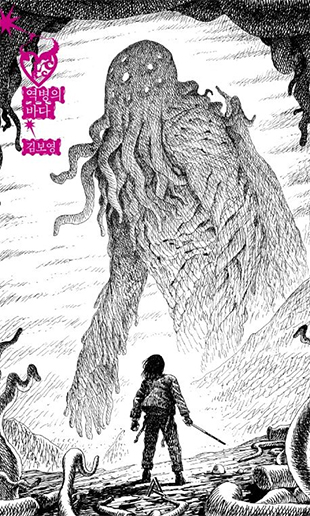|
Korean Authors
Writer Kim Bo-Young The Strongest SF Writer
2023.04.03
Writer Kim Bo-Young, one of the representative SF writers in Korea, has had a significant influence on newly-debuted SF writers since the 2000s with her flexible ideas and wonderful imagination. She was the first Korean writer to introduce her short story – An Evolutionary Myth - in Clarkesworld, an SF magazine in the US. Also, she has been a popular writer among international readers, as seen in the publication of her book in the US by Harper Collins, a big publishing house in the country. Writer Kim Bo-Young is known to dedicate herself fully to writing stories with the mindset that every work is her last story to be shown to the world. Following is an interview with writer Kim, who has been going across boundaries in the literary world beyond SF.

It’s an honor to have you on K-Book Trends. Please briefly introduce yourself to our subscribers.
Hello, everyone. I’m Kim Bo-Young, and I’ve been mainly writing SF in Korea since 2004.

We heard you were a game developer and scenario writer before becoming a novelist. What was the motivation behind such a transition?
I used to be a game developer from late 1998 to 2004. It was ages ago. At that time, the paradigm in the gaming industry was shifting to online games. Making games before the Internet was distributed was similar to publishing books. Several members gathered to make games, sold thousands of copies, and things were very tough.

Games and novels are similar in that they create a world and tell stories to their users and readers through narration. But their formats are different. So, how are the two different in terms of production?
The two are totally different creations. Novels, no matter how advanced technology is, are written in letters. Similarly, movies are made in a video format, no matter what. But games are different. When the technology changes, the game’s style changes. And that technology is a new technology, and the game made with it is also a new game. As the Internet was at its peak of advancement around the time I was in a game company, the changes were particularly super rapid.
I thought of writing a story for myself, not thinking about how many readers there might be.

You posted your short story An Evolutionary Myth on Clarksworld, an SF magazine in the US, as the first Korean writer. It is more meaningful because you were the “first Korean writer” to have the work published in the magazine. How did you feel?
To be honest, I didn’t know what Clarksworld was, and I didn’t know that I was the first one. Director Park Ji-Hyeon and writer Gord Sellar thankfully translated the story for free. We never knew that we would be able to publish it. Gord suggested we “submit the book to the biggest publisher first and repeat it until someone accepts it.” And luckily, the one that we submitted to first accepted the book. It was the starting point of all the other works’ translations. So, I am thankful to her and director Park for translating the story.
An Evolutionary Myth (Editorial) revised and

Your books, such as I’m Waiting for You (Neo Paran) and The Prophet of Corruption (Arzaklivres), were introduced in overseas markets through Harper Collins, a big publishing house in the US. How was the response from international readers?
I didn’t actually have the chance to have a detailed look at their reviews, but I heard about news articles. I heard many media outlets, including The New York Times in the US and The Times in the UK, introduced my books. National Public Radio (NPR), a public radio station in the US, chose the books as the book of the year, and GoodReads, a book-review website, picked the books as one of the most popular SF books in 2021. Also, Reddit chose the book as one of the best anthologies in 2021. I’m so thankful for everything.

Is there a book you want to recommend to international readers that has yet to be released in overseas markets?
The book The Sea of Epidemic (Alma), a Korean reinterpretation of the book The Shadow Over Innsmouth by H. P. Lovecraft, has yet to be introduced to international readers. This book belongs to the Project LC.RC series, an hommage to H. P. Lovecraft, the origin of modern horror literature. As this series consists of medium-length stories by several writers, it would be great to read it along with other works.
I’m Waiting for You, The Prophet of Mundanity, and The Sea of Epidemic

You have been “the strongest SF writer.” What does SF mean to you?
Let me quote Djuna, a film critic and SF writer in Korea. Djuna said that he writes SF stories because it has the least limitations. He/She is not just interested in the narrow concept of SF, but is intrigued by the genre’s characteristic that it is a giant genre inclusive of all the things people can imagine. I couldn’t agree more with his idea.
Whenever I write a story, I always think that I’m writing the last novel in my life.

You also stand up for minorities through your novels. Was there a special reason for this?
Novels are not a medium for something. The norm of storytelling is intrinsically related to understanding and empathizing with the nature of human beings and life. I don’t think it’s about having something in mind when writing. Writer Park Wan-Seo once said, “If I could say it in one sentence, I would never have written novels.” As such, novels are complicated, and I believe that we write and read novels to discuss and agree with such complicatedness.

As you have been working in a wide variety of fields, your next move is highly anticipated. What are your future plans, and what do you want to write about next?
For now, the novels I’m writing are everything I have. But, once they’re over, they fade away, and new novels come. I used to be harsher on myself in the past. I thought there would be no more chances after completing the novel I was writing. So, I have always had the mindset that the story I’m writing is the last one that I’ll be showing the world, and that I should write stories with the finest quality. But, I was always given more opportunities after finishing a story. So, with that expectation in mind, I shall complete the story I’m writing today.
#Kim Bo-Young#Novelist#SF#An Evolutionary Myth |
Pre Megazine
-

Jakkajungsin Publishing Co.
VOL.69
2024.04 -

Writer Yun Jung-Eun
VOL.69
2024.04 -

Jumping Books Publishing House
VOL.68
2024.03 -

Writer Kim Hwa-Jin
VOL.68
2024.03 -

Publisher Hyohyung
VOL.67
2024.02 -

Writer Minha
VOL.67
2024.02 -

Almond Publishing
VOL.66
2024.01 -

Writer Kwon Jung-Min
VOL.66
2024.01 -

Hakgojae Publishers
VOL.65
2023.12 -

Writer Kim Hye-Jung
VOL.65
2023.12 -

Eidos Publishing House
VOL.64
2023.11 -

Writer Hwang In-Chan
VOL.64
2023.11 -

Munhakdongne
VOL.63
2023.10 -

Writer Chang Kang-myoung
VOL.63
2023.10 -

Happywell Publishing
VOL.62
2023.09 -

Writer Baik Soulinne
VOL.62
2023.09 -

Dasan Contents Group (Dasan Books)
VOL.61
2023.08 -

Writer Lim Kyoung-Sun
VOL.61
2023.08 -

SpringSunshine Publishing Co.
VOL.60
2023.07 -

Writer Lee Kyung-Hye
VOL.60
2023.07 -

Human Cube
VOL.59
2023.06 -

Doctor Jeong Jae-Seung
VOL.59
2023.06 -

Anonbooks
VOL.58
2023.05 -

Writer Son Bo-Mi
VOL.58
2023.05 -

Namhaebomnal
VOL.57
2023.04 -

Writer Kim Bo-Young
VOL.57
2023.04 -

Hugo Publishing
VOL.56
2023.03 -

Writer Cho Kwang-Hee
VOL.56
2023.03 -

Balgeunmirae Publishing Co.
VOL.55
2023.02 -

Writer Lee Byung-Ryul
VOL.55
2023.02 -

Wisdom House, Inc
VOL.54
2023.01 -

Writer Jeong Jia
VOL.54
2023.01 -

Humanitas
VOL.53
2022.12 -

Writer Kim Yeon-Su
VOL.53
2022.12 -

Songsongbooks
VOL.52
2022.11 -

Writer Eun Hee-Kyung
VOL.52
2022.11 -

Bombom Publishing Co.
VOL.51
2022.10 -

Writer Jiwon Yu
VOL.51
2022.10 -

Hangilsa Publishing Co., Ltd.
VOL.50
2022.09 -

Writer Kim Won-Young
VOL.50
2022.09 -

Moksu Publishing Company
VOL.49
2022.08 -

Writer Yoo Sun-Kyong
VOL.49
2022.08 -

Next Wave
VOL.48
2022.07 -

Writer Park Sang-Young
VOL.48
2022.07 -

A Thousand Hopes
VOL.47
2022.06 -

Writer Bora Chung
VOL.47
2022.06 -

Woongjin ThinkBig
VOL.46
2022.05 -

Dr. Oh Eun-Young
VOL.46
2022.05 -

JECHEOLSO Publishing House
VOL.45
2022.04 -

Writer Jang Ryu-Jin
VOL.45
2022.04 -

Changbi Publishers
VOL.44
2022.03 -

Writer Kim Ho-Yeon
VOL.44
2022.03 -

Mati Books
VOL.43
2022.02 -

Writer Lee Kkoch-Nim
VOL.43
2022.02 -

Picturebook Gongjackso
VOL.42
2022.01 -

Writer Kim Sang-Wook
VOL.42
2022.01 -

Writer So-yeon Park
VOL.42
2022.01 -

Writer Yoo Eun sil
VOL.42
2022.01 -

Kungree Press
VOL.41
2021.12 -

Writer Kim Lily
VOL.41
2021.12 -

Writer Park Yeon-jun
VOL.41
2021.12 -

Writer Yi Hyeon
VOL.41
2021.12 -

A deeper world told through picture books 'Iyagikot Publishing (Story Flower)'
VOL.12
2019.06 -

Author Jeon Min-hee
VOL.12
2019.06 -

Illustrator Kim Hwan-Young
VOL.13
2019.07 -

Travelers sailing through the sea of knowledge - 'Across Publishing Group Inc.'
VOL.13
2019.07 -

Genre Novel Publisher 'Arzak Livres'
VOL.14
2019.08 -

Author Lee Yong-han
VOL.14
2019.08 -

Wookwan Sunim
VOL.15
2019.09 -

East-Asia Publishing
VOL.15
2019.09 -

Author Jo Jung-rae
VOL.16
2019.10 -

EunHaeng NaMu Publishing
VOL.16
2019.10 -

Writer Heo Kyo bum
VOL.40
2021.11 -

Writer Kim So-Young
VOL.40
2021.11 -

Author-illustrator Kim Sang Keun
VOL.40
2021.11 -

ACHIMDAL BOOKS
VOL.40
2021.11 -

Author Kang Gyeong-su
VOL.17
2019.11 -

Moonji Publishing Belongs to the Literary Community
VOL.17
2019.11 -

Author Kim Yun-jeong
VOL.18
2019.12 -

I-Seum
VOL.18
2019.12 -

Kim Cho-Yeop
VOL.19
2020.02 -

Creating a window into the future with books
VOL.19
2020.02 -

Author Serang Chung
VOL.20
2020.03 -

Hey Uhm
VOL.20
2020.03 -

Writer Lim Hong-Tek
VOL.21
2020.04 -

BIR
VOL.21
2020.04 -

Writer Song Mikyoung
VOL.39
2021.10 -

Author-illustrator Kim Dong Su
VOL.39
2021.10 -

Writer Lee Seula
VOL.39
2021.10 -

Tabi Books
VOL.39
2021.10 -

Writer Kim Soo-hyun
VOL.38
2021.09 -

Author-illustrator Lee Myoung Ae
VOL.38
2021.09 -

Writer Hwang Sunmi
VOL.38
2021.09 -

Kidari Publishing Co.
VOL.38
2021.09 -

Writer Sohn Won-Pyung
VOL.22
2020.05 -

Woods of Mind's Books
VOL.22
2020.05 -

Writer Heungeul
VOL.23
2020.06 -

Gloyeon
VOL.23
2020.06 -

Maumsanchaek
VOL.24
2020.07 -

Winners of the 2021 Bologna Ragazzi Award
VOL.37
2021.08 -

Picture book artist Lee Suzy
VOL.37
2021.08 -

Author-illustrator Yi Gee Eun
VOL.37
2021.08 -

Hubble
VOL.37
2021.08 -

Writer Baek Se-Hee
VOL.25
2020.08 -

Bearbooks Inc.
VOL.25
2020.08 -

Author Baek Hee-Na
VOL.26
2020.09 -

Yuksabipyoungsa
VOL.26
2020.09 -

Writer Kang Hwa-Gil
VOL.27
2020.10 -

Kinderland (Bandal)
VOL.27
2020.10 -

Writer Ha wann
VOL.36
2021.07 -

Author-illustrator Myung Soojung
VOL.36
2021.07 -

Writer Jung Yeo-Wool
VOL.36
2021.07 -

Publisher EcoLivres
VOL.36
2021.07 -

Writer Lee Geumi
VOL.28
2020.11 -

Sakyejul
VOL.28
2020.11 -

Writer Kim Keum-Hee
VOL.29
2020.12 -

Geulhangari
VOL.29
2020.12 -

Writer Cheon Seon-Ran
VOL.30
2021.01 -

Hyang Publishing House
VOL.30
2021.01 -

Writer Lee Hee-Young
VOL.31
2021.02 -

Sanzini
VOL.31
2021.02 -

Publisher Prunsoop
VOL.32
2021.03 -

Writer Sim Yun-Kyung
VOL.32
2021.03 -

Hanbit Media
VOL.35
2021.06 -

Hyeonamsa
VOL.33
2021.04 -

Author-illustrator Noh Inkyung
VOL.33
2021.04 -

Writer Cho Won-Jae
VOL.35
2021.06 -

Writer Kim Jung-Mi
VOL.34
2021.05 -

Safehouse Inc.
VOL.34
2021.05


